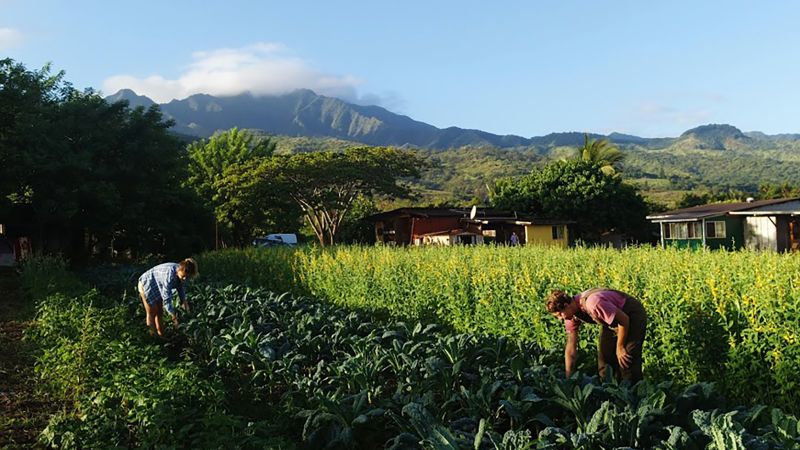Copyright Cable News Network

As she scrolled through videos of travelers doing volunteer work in exchange for free accommodation, digital nomad Naiara Saiz Bilbao thought she’d hit the jackpot. She went to one of the most popular volunteer travel platforms, searched for something similar, and came across a listing for a role at a hostel in Costa Rica. The tag line, “Do you like nature and dream of living by the sea?” piqued her interest immediately. As she read on, Saiz Bilbao, originally from Spain, learned that the volunteer position would involve completing social media tasks for a couple of hours a day, five days a week, in exchange for a free stay at a sleek hostel in a popular seaside town, surrounded by luscious jungle and complete with a pristine pool. A seasoned traveler who’d fallen hard for the Central American country after visiting several times, Saiz Bilbao was excited by the opportunity and quickly signed up. It seemed like a dream come true, and to Saiz Bilbao, a solo female traveler, the role also seemed secure. “At least I’m going to feel safe,” she recalls thinking. “With a volunteer program organized through a paid platform, you feel sure the place you’re going to will take care of you.” Unfortunately, things didn’t turn out as she expected. Earlier this year, Saiz Bilbao arrived at a dilapidated building still under construction, its entrance via a seemingly endless stretch of stairs that led to a window-less hostel. “It was a disaster,” Saiz Bilbao says. “It looked like a jail.” She later found that the unappealing appearance of the hostel was the least of her problems. Exploding industry Saiz Bilbao is one of countless travelers to be lured by a volunteering opportunity abroad. Travel volunteering — exchanging skills for accommodation and sometimes food or other benefits — has long been a pillar of the backpacking community. “The idea goes back to the time of Jesus Christ,” says Shay Gleeson, the founder of Helpstay, an online platform which connects volunteers with hosts across more than 100 countries. “It’s essentially bartering. In return for a free stay, you help out. You pitch in.” Millennia on from the biblical age, travel volunteering has exploded with popularity, largely thanks to the internet. More than seven million people from 140 countries are members of Worldpackers, the online platform claims, making it the biggest player in the industry. Its main competitor, Workaway, offers 50,000 experiences, while ecological farming-focused volunteering platform Worldwide Opportunities on Organic Farms (WWOOF) says it’s attracted more than 100,000 members. Volunteering opportunities across each of these platforms are as vast and varied as any other form of travel, from hostels seeking receptionists, cleaners and party promoters, to surf schools in need of teachers, to local families looking for childcare workers. There are even opportunities for live musicians to play gigs or artists to decorate buildings. Worldpackers says nearly half of its hosts are non-profit organizations that credit volunteers as being essential to their operations. The online platform also stresses that these exchanges are not jobs, but rather cultural experiences, adding that a new, separate “jobs” category will be launching on the site soon. It’s not just digital nomads like Saiz Bilbao who are looking for volunteering opportunities and are willing to pay the platforms’ subscription fees. Millions of young people are flocking to volunteering as a time-rich and cash-poor mode of seeing the world, with many viewing volunteering as an adventurous alternative to more sanitized forms of travel, such as organized tours. “Younger generations are searching for more than photos or checklists,” says Worldpackers co-founder and CEO Ricardo Lima. “They’re not looking for ‘mainstream tourism’ — they want immersive, authentic experiences.” Transformative experience Traveler Jenna Pollard, originally from South Dakota, had her first international volunteering experience at a family peanut farm near Pai, in northern Thailand, when she was 28. Pollard, who worked on the farm for 10 days back in 2016, says she was attracted by the notion of being able to travel in a more connected way, rather than simply “staying in a hotel and seeing the sights.” “I made friends, learned some language, helped out with a ton of projects and ate amazing food,” she laughs. What more could she want? Today, Pollard lights up while describing her host’s 10-year-old daughter and the bamboo-built structures they lived among. Now the engagement and education program manager at WWOOF USA, Pollard considers volunteering a life-changing experience. “For a lot of people, they come out of it feeling like their faith is restored in humanity,” she says. “They’re living in harmony, not just with other people but with the planet.” In Pollard’s view, this transformative magic alchemizes when complete strangers connect and become friends. It all “starts with a leap of faith that it’s going to be a good fit,” she says. But while Pollard’s “leap of faith” sparked a career and life-long passion, Saiz’s ended in disaster. In addition to the host’s misleading profile, she claims that she was treated more like an unpaid employee than a volunteer at the hostel. Despite having agreed to complete social media tasks, Saiz Bilbao was instead told to clean the hostel’s toilets and other areas — at first a little every other day, then every day, then for eight hours per day. Saiz Bilbao says she wasn’t provided with any protective equipment or formal training on handling the toxic chemicals she was using. “The bleach was burning my fingers,” she tells CNN. According to Saiz Bilbao, the final straw came when she discovered her belongings had been rifled through, and the $400 she had stored in her backpack’s hidden compartment was gone. After telling her manager that she wouldn’t be continuing on at the hostel as a result, Saiz Bilbao says she was offered $50 in exchange for not posting a negative review on the online platform that had advertised the role. She refused. Risky business? Saiz Bilbao’s volunteering experience may have been memorable for all the wrong reasons, but was her decision to volunteer any riskier than traditional travel? All of the major platforms say they seriously prioritize volunteer safety and take active steps to prevent dangerous situations. Helpstay says its founder personally reviews every host on its platform, while WWOOF conducts ID checks and requests photos of the areas where volunteers will eat and sleep. Worldpackers says it vets its hosts based on references and will travel to inspect locations where possible. Each of the platforms monitor performance through reviews and provide members with support services like specific hotlines to contact when things go wrong. Yet, in the same breath, these platforms stress that they only provide a connecting service, and hosts and volunteers are primarily responsible for themselves and their personal safety. Travel is never risk-free, they argue, and volunteering is no different. Gleeson says Helpstay advises all its members to conduct their own research and organize robust back-up plans as they should in any travel situation. He adds that most volunteers on his platform do so. “We are not a hand-holding service,” Gleeson asserts. “This is travel for grown-ups.” Lima goes even further, saying that he’s ‘‘more worried about the risks people take by not going traveling than the risks of it.” But Saiz is worried that the romanticization of volunteering on social media has minimized the importance of such preparation. She feels that the volunteering platforms are marketed at people who can’t afford regular travel – and for whom getting into a bad situation is especially risky. Worldpackers claims the influencers it works with are genuine volunteers who “aren’t selling a product – they’re amplifying a movement.” Women are particularly vulnerable to volunteering-gone-wrong. According to Gleeson and Lima, approximately 70% of Helpstay’s and 64% of Worldpackers’ members are female. This over-representation is in part due to the perception that volunteering through a platform makes traveling safer. Women feel reassured that many of the challenges they face when traveling, such as harassment and assault, can be somewhat mitigated by the extra precautions of host vetting and reviews. But when that’s not enough and a volunteering experience does go wrong, it is exactly these risks that women can face, and that Saiz Bilbao wishes were discussed more online. Gleeson says that Helpstay’s female members do discuss the issue, and that they are the ones driving conversations for improvement, proactively leaving reviews, and flagging unacceptable hosts. Speaking via Zoom from a different Costa Rican hostel, Saiz Bilbao stresses that she doesn’t want her experience to dissuade women or other people from volunteering. Rather, she wants to encourage other travelers to remain cautious and research diligently. “Don’t not go,” she says. “Go, but be prepared.”



